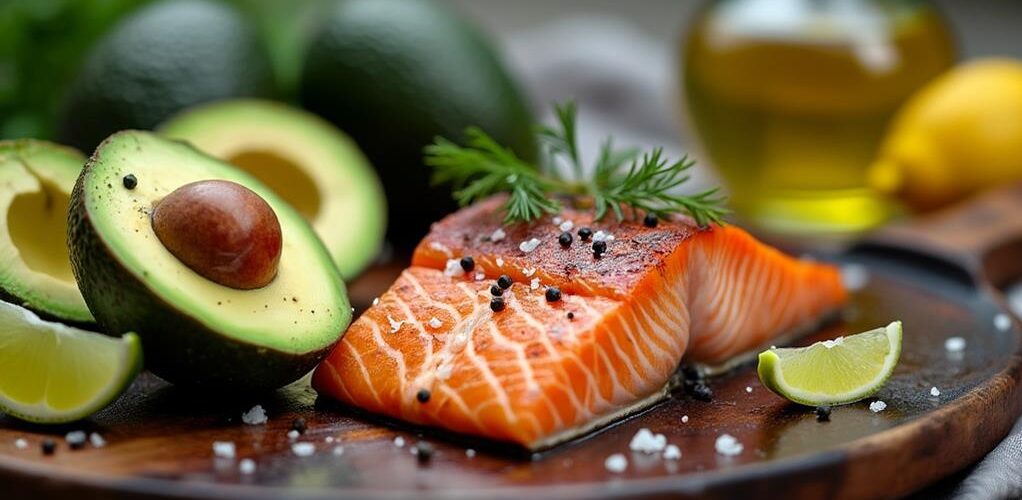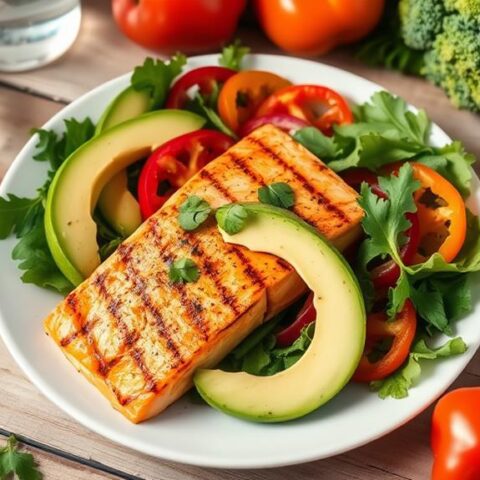
For optimal results on a ketogenic diet, embracing nutrient-rich fats is crucial. Avocados and avocado oil provide heart-healthy monounsaturated fats and aid in absorbing essential vitamins. Olive oil, celebrated for its anti-inflammatory properties, can enhance your meals while supporting heart health. Nuts and seeds, packed with healthy fats and omega-3s, offer satiating snacks and important nutrients. Coconut oil focuses on medium-chain triglycerides for efficient energy use. Finally, fatty fish like salmon and mackerel supply ample omega-3s and protein, promoting cardiovascular wellness. Each of these fat sources offers unique nutritional benefits that contribute to a well-rounded keto lifestyle.
Key Takeaways
- Avocados and avocado oil are high in monounsaturated fats and support nutrient absorption on a keto diet.
- Olive oil and olives reduce inflammation and improve heart health, making them essential for keto meals.
- Nuts and seeds provide healthy fats and protein, beneficial for maintaining ketosis and cardiovascular health.
- Coconut oil and coconut products are rich in MCTs, which are efficiently absorbed for energy on a keto diet.
- Fatty fish like salmon and mackerel are rich in omega-3s, supporting heart health and anti-inflammatory properties.
Avocados and Avocado Oil
Some may already know that avocados and avocado oil are exceptional additions to a ketogenic diet, primarily due to their high content of monounsaturated fatty acids (MUFAs).
Avocados, providing approximately 10.5 grams of fat and a mere 1 gram of net carbs per half fruit, offer significant avocado benefits for those pursuing low-carb, high-fat nutrition. Their nutritional profile is additionally enriched by fiber, vitamins, and essential minerals, supporting heart health and balanced blood sugar levels.
Avocados are also packed with antioxidants, which have anti-inflammatory properties that contribute to cardiovascular health.
Avocado oil, on the other hand, presents itself as a versatile cooking option, containing about 14 grams of fat and no carbohydrates per tablespoon. Its stability under high-heat conditions makes it ideal for sautéing and frying, while its mild flavor enhances salad dressings without overpowering other ingredients.
This cooking versatility guarantees that individuals can seamlessly incorporate it into various culinary applications. The anti-inflammatory compounds and healthy fats in avocados have been linked to a reduced risk of heart disease.
Moreover, regular consumption of both avocados and avocado oil can enhance the absorption of fat-soluble vitamins such as A, D, E, and K, making them integral components of a nutrient-dense ketogenic diet.
Olive Oil and Olives
Building on the benefits of avocados and avocado oil, olive oil and olives offer another robust source of healthy fats for those adhering to a ketogenic diet. Olive oil, particularly rich in monounsaturated fats like oleic acid, is associated with significant health benefits, including reduced inflammation and improved heart health.
Enhanced lipid profiles are one of the key advantages of incorporating olive oil, as it can help manage cholesterol levels and reduce the risk of cardiovascular diseases. With each tablespoon containing approximately 119 calories and 13.5 grams of fat, olive oil is a potent source of the healthy fats essential for maintaining ketosis.
Olives, on the other hand, present a nutrient-dense snack option, offering healthy fats, vitamin E, and antioxidants. Ten olives provide about 4 grams of fat and merely 1 gram of net carbs, making them a keto-friendly choice.
The anti-inflammatory compounds found in both olives and olive oil can contribute to lower blood pressure and a reduced risk of chronic diseases, aligning with the overall health benefits sought by many on a ketogenic diet.
Incorporating olive oil into meals not only enhances flavor but also boosts nutritional content, supporting the high-fat requirements of a keto diet. Its versatile culinary uses range from salad dressings to sautéing, ensuring that it fits seamlessly into diverse meal plans.
Nuts and Seeds
Nuts and seeds stand as powerhouses of nutrition, offering an abundant source of healthy fats essential for those following a ketogenic diet. Their rich nutrient profile supports cardiovascular health, aids in reducing inflammation, and provides a satisfying crunch that fits seamlessly into a keto lifestyle.
Almonds, for instance, with 14 grams of fat per ounce, are an exemplary keto snack, providing plant-based protein and fiber without the carb load. Walnuts, known for their omega-3 fatty acid content, deliver 18 grams of fat per ounce, promoting heart health.
Additionally, seeds like pumpkin and chia are high in nutrients such as iron, magnesium, and omega-3s, making them valuable additions to any diet. Nut butter benefits extend beyond flavor; almond and peanut butter, when devoid of added sugars, offer a convenient way to incorporate healthy fats.
Almond butter, with 8.9 grams of fat and minimal net carbs per tablespoon, is a nutritious addition to any keto meal plan. Meanwhile, seed varieties like chia and flax seeds bring versatility and nutrient density, with chia seeds offering roughly 8.7 grams of fat and only 2.1 net carbs per ounce.
These seeds are perfect for enhancing recipes, adding texture and nutritional value without compromising keto principles. Embracing these nutrient-dense foods can greatly bolster a ketogenic regimen.
Coconut Products
For individuals embracing a ketogenic diet, coconut products serve as a potent source of healthy fats that support nutritional goals.
Coconut oil is particularly valuable, boasting medium-chain triglycerides (MCTs) that are efficiently absorbed and converted into energy. This makes coconut oil a preferred choice for those seeking to sustain ketosis effectively. A single tablespoon provides approximately 104 calories and 11.5 grams of fat, including 9.6 grams of saturated fat, underscoring its role in enhancing fat intake.
Additionally, incorporating coconut products can help maintain fluid balance by ensuring adequate fat intake, which supports overall energy levels.
Coconut milk, another versatile option, is rich in healthy fats, offering about 445 calories and 48 grams of fat per cup. Its application in coconut recipes can enhance both flavor and nutritional value, making it a popular ingredient in curries and smoothies.
Additionally, coconut flour, derived from coconut meat, is low in carbohydrates and high in fiber, providing 60 calories and 8 grams of carbs per 1/4 cup. This makes it an ideal choice for keto baking, allowing for the creation of nutrient-dense, low-carb treats.
Incorporating coconut products into daily meals not only supports ketosis but also contributes to a varied and enjoyable diet, emphasizing the coconut benefits central to a ketogenic lifestyle.
Fatty Fish
Among the top choices for keto-friendly fats are fatty fish, celebrated for their rich content of omega-3 fatty acids. These essential nutrients, found in fish varieties like salmon, tuna, mackerel, and sardines, offer numerous omega 3 benefits, including anti-inflammatory properties and heart health improvements. A 3.5-ounce serving of salmon not only provides 25 grams of protein but is also a significant source of vitamin D, consequently supporting bone health and immune function. Consistent consumption of fatty fish has been associated with enhanced brain health, a reduced risk of cognitive decline, and lower heart disease incidence.
| Fish Variety | Omega-3 Content (mg/serving) | Additional Benefits |
|---|---|---|
| Salmon | 1,500 | Rich in vitamin D |
| Tuna | 1,000 | High protein, low mercury |
| Mackerel | 2,000 | Supports mental wellness |
| Sardines | 1,400 | Affordable, sustainable |
The omega-3 fatty acids in these fish varieties help balance cholesterol levels by boosting HDL (good) cholesterol and lowering triglycerides. Incorporating fatty fish into a keto diet not only diversifies meal options but also contributes to the fat intake necessary for maintaining ketosis, making it an indispensable component of a health-focused dietary regimen.
Frequently Asked Questions
What Are the Best Fats for Keto Diet?
To optimize a ketogenic diet, prioritize healthy fats from fat sources like avocados, olive oil, nuts, chia seeds, and coconut oil. These options provide essential fatty acids, support heart health, and facilitate effective ketosis while ensuring nutritional balance.
What Are the Top 10 Keto Foods?
Top 10 keto foods include nutrient-rich options such as avocado, nuts, and fatty fish, complemented by keto snacks and low carb desserts. These choices support ketosis through balanced macronutrient profiles, enhancing overall health and dietary adherence.
What Are the Best Fatty Meats for Keto?
Pork belly and ribeye steak are exemplary choices for a keto diet. Their high-fat content supports ketosis, while providing essential nutrients. These meats aid in maintaining a balanced macronutrient profile, vital for effective and sustainable dietary adherence.
What Are Bad Fats to Avoid on Keto?
Avoid trans fats and certain vegetable oils on a keto diet due to their association with increased heart disease risk and inflammation. Opt for healthier alternatives to support cardiovascular health and maintain dietary goals effectively.
Conclusion
Incorporating healthy fats is essential for the success of a ketogenic diet. Avocados and avocado oil provide monounsaturated fats and essential nutrients, while olive oil and olives offer heart-healthy benefits. Nuts and seeds contribute protein and fiber, promoting satiety. Coconut products supply medium-chain triglycerides, enhancing ketone production. Fatty fish deliver omega-3 fatty acids, supporting cardiovascular health. A balanced intake of these fats can optimize nutritional status and align with evidence-based dietary recommendations for individuals following a ketogenic lifestyle.










No Comments